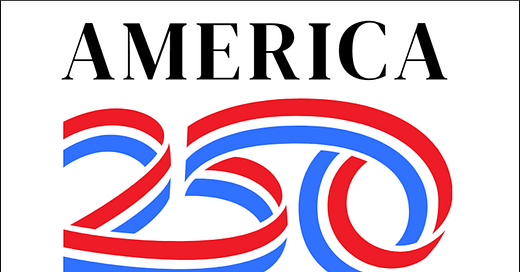I’ve been reading recently about the nationwide plans to celebrate the 250th anniversary of the signing of the Declaration of Independence in July of 1776. The official name for this anniversary is the Semiquincentennial (or Sestercentennial or Quarter Millennial – which of these awkward names do you prefer?) You can find out more about this on the America250 website. In Virginia, the planned celebration is titled VA250; in Massachusetts, it’s Revolution250; in Pennsylvania it’s America250PA. You get the idea.
For my upcoming Tuesday essays, I’ve decided to write about what was happening on these dates (or in the same week) 250 years ago. I’m looking forward to writing these essays; they’ll give me a chance to review this important sequence of events and reflect on their meaning both for their own time and for today.
First, let me introduce you to what some historians call “The Long 1774” – from the Boston Tea Party on December 16, 1773 to the Battles at Lexington and Concord on April 19, 1775. The traditional narrative is pretty straightforward, stressing the colonies’ united support for Boston, which Parliament penalized by closing the port after June 1, 1774, until the East India Company was reimbursed for the tea. The cause of Boston, George Washington famously asserted, was “the cause of America.”
Therefore, when delegates from the colonies, including Washington and other prominent Virginians, met in Philadelphia at the First Continental Congress in September and October 1774, they formally claimed rights within the empire, adopted a boycott of British manufactures, and called for the election of local committees to enforce that boycott. Over the following months, the standard narrative continues, the committees encountered only slight resistance, and when war began in mid-April, the colonies again rallied in support of Massachusetts.
As you can probably imagine, things were more complicated than this narrative would suggest. Many of the leaders we associate with the Revolution – George Washington, Benjamin Franklin, and John Adams, for example – continued to plead for reconciliation and moderation throughout the year. Political disagreements existed, even among Virginians, who are commonly characterized as strong supporters of the Revolution. Those who opposed it nevertheless voiced criticisms of British policy. And those Americans’ divergent reactions to the events of 1774 were crucial in dividing the populace into new and lasting political alignments — Loyalists and Revolutionaries.
It would have been better if I had started this series at the beginning of 2024. But I didn’t, so I’ll start now. As I write these essays, I’ll reference the earlier events in my explanations of what’s happening in any given week.
Preview of Next Week: On May 17, the Colony of Rhode Island and Providence Plantations (the colony’s official name) issued the first call for an “Intercolonial Congress.”





I know I'm going to like this series. Thanks.
What a great idea! Thanks!!